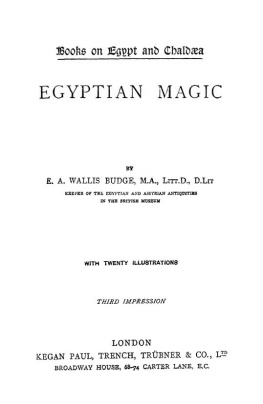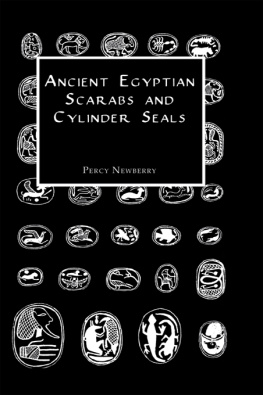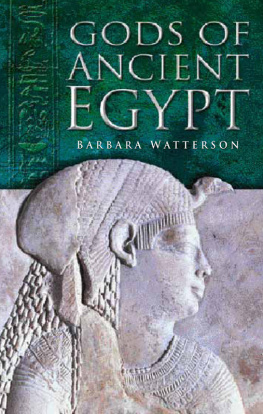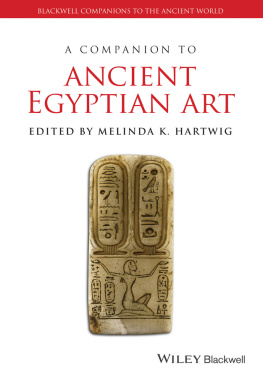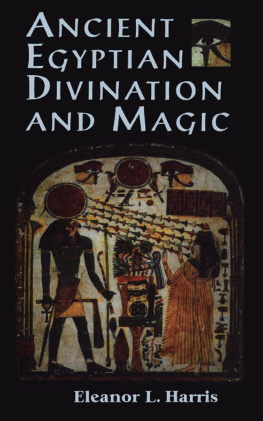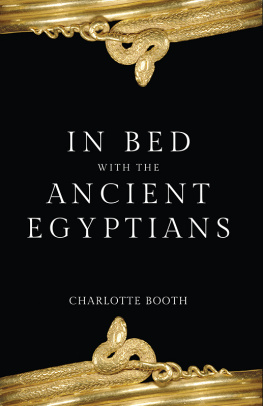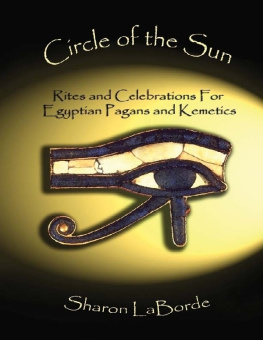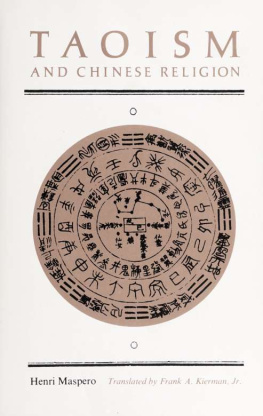Copyright
Copyright 1948 by Columbia University Press
Copyright renewed 1975 by Enriqueta Frankfort
All rights reserved.
Bibliographical Note
This Dover edition of Ancient Egyptian Religion: An Interpretation , first published in 2000, is a slightly corrected, unabridged republication of the book originally published under the same title in 1948 by Columbia University Press, New York.
Library of Congress Cataloging-in-Publication Data
Frankfort, Henri, 18971954.
Ancient Egyptian religion : an interpretation / by H. Frankfort.
p. cm.
Originally published: New York : Columbia University Press, 1948.
9780486144955
1. EgyptReligion. I. Title.
BL2441.2 .F74 2000
299.31dc21
99-088142
Manufactured in the United States by Courier Corporation
41138902
www.doverpublications.com
Preface
EGYPTIAN religion aroused the interest of the West long before the hieroglyphs were deciphered. The fabulous antiquity of Egyptian civilization and its stupendous ruins have always suggested a background of profound wisdom. Plutarch set the fashion of writing under that impression, and it has continued to the present day. But the decipherment of the documents has disappointed centuries of expectation: it revealed a remarkable lack of philosophical content, at least in a form which we can assimilate. Instead the texts introduce us to an apparent jungle of religious matter, so impenetrable to our understanding that Egyptologists have increasingly shunned the task of interpretation.
Erman, the first to base a description of Egyptian religion on a full understanding of the language, gave in 1905 a masterly but patronizing account of weird myths, doctrines, and usages, while the peculiarly religious values which these contained remained hidden from his lucid rationalism. Since then interpretation has lagged. W. B. Kristensen in Leiden continued the elucidation of specific symbols, but the most prolific writersKees and his followersassumed towards our subject a scientists rather than a scholars attitude: while ostensibly concerned with religion, they were really absorbed in the task of bringing order to a confused mass of material.
Men of this school have dominated the subject for the last twenty or thirty years; they possess a splendid knowledge of the texts and have enriched our information greatly. But in reading their books you would never think that the gods they discuss once moved men to acts of worship. Moreover, they denyexplicitly or by implicationthat one can speak of Egyptian religion as such. They see a number of unrelated local cults which existed side by side; and they even succeed in explaining the fact that certain beliefs were held by all Egyptians without referring to religion at all. According to their view (and it is widely accepted today) the nation-wide validity of a doctrine was always the consequence of political power, exercised at one time or another by the city of its origin. These men, therefore, evade the problem altogether; for when we ask how people in the vanguard of civilization could believe what their documents proclaim, it is not relevant to answer that the Amon priests at Thebes induced a king of Theban origin to propagate the cult of Amon.
Scholars who deal with our subject in this manner not only ignore religion as a phenomenon sui generis, but are unable to see the wood for the trees. The unity of the Egyptian people is an established fact with respect to language, material culture, and even physique. It would be absurd to assume that there did not exist a corresponding unity in the domain of the spirit. We shall, in fact, attempt to discover that unity in the course of this book. We shall go beyond the local and temporal differences in cults and dogmas, and look for those trends and qualities that seem to have shaped the character of Egyptian religion as a whole. This means, of course, that we shall have to disregard a great many details, however interesting they may be. We shall have to concentrate on what appear to have been the main religious preoccupationssometimes the religious obsessionsof a highly civilized people. And we shall find that it is possible to view the monstrous as well as the profound in Egyptian religionwith amazement perhaps, but also with respect.
It will appear, moreover, that the Egyptian doctrines are not without coherence. They were rooted in a single basic conviction, to wit that the universe is essentially static. The Egyptian held that he lived in a changeless world. It is irrelevant that his view, whether it be applied to nature or to society, seems untenable to us. What matters is that the Egyptian held it, and that it informed not only his theology but also his moral and political philosophy. Not as an articulate doctrine, but nevertheless decisively, it determined the forms he gave to his state and his society, to his literature and his art. In fact, we have recognized the Egyptians view of the world only through the study of those forms, and we are summarizing in this Preface, not an a priori opinion, but the conclusion reached in the course of work which extended over a number of years. In this book we have, as it were, approached the Egyptians beliefs from five distinct directions and found each time that these beliefs possessed a clearly recognizable individuality. The peculiar character of Egyptian religion appeared to derive precisely from an implicit assumption that only the changeless is ultimately significant.
It is true, of course, that Egyptian beliefs were in themselves subject to change; but we have not discussed those which were peculiar to a limited period. It may one day be possible to write a history of Egyptian religion describing the changes which it underwent in the course of time. At present we are still endeavoring to recognize what was the subject of those changes. Before tracing the history we should establish the identity of Egyptian religion.
It may be argued that such an attempt is, even now, premature: many texts are still unpublished, others are only preserved in fragments, others again are obscure. But we have gradually come to reject this view as defeatist. During many years of constant preoccupation with religious phenomena of the Ancient Near East we have become increasingly convinced that the material allows us to define at least some essentials of Egyptian beliefs. Moreover, the textual difficulties are not the main obstacle to our understanding if they were, it would be presumptuous for an archaeologist to deal with the subject at all. Those difficulties are aggravated by the limitations which a nineteenth-century viewpointwhether evolutionary or rationalisticimposed upon scholars who were the otherwise undisputed masters of Egyptology. We have discussed this matter at the beginning of this Preface; the attitudes described there agree in obscuring the profound difference in mentality which separates the ancients from ourselves. Yet an awareness of that difference is a prerequisite of true understanding, and in two recent publications an attempt has been made to define its scope. The opening and concluding chapters of The Intellectual Adventure of Ancient Man (Chicago, 1946) describe the distinction between the mythopoeic thought of the ancients and the critical thought of modern times. In Kingship and the Gods (Chicago, 1948) we have attempted to collect and to interpret all the evidence bearing on one single subject, the integration of society and nature mediated by the king.





